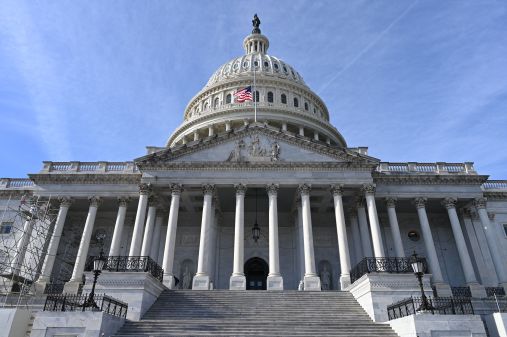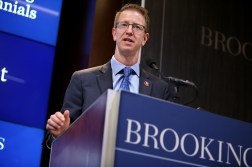6 ways Congress can better encourage open data

The Center of Data Innovation has come out with a number of ways Congress can help further the use of open data. (Pixabay)
President Barack Obama has done a lot to open government data during his tenure, using directives and other executive actions to push measures through. However, those initiatives aren’t guaranteed to continue once someone else assumes office in 2017.
With that in mind, the Center for Data Innovation released a number of recommendations Monday aimed at showing members of Congress how they can spur the use of open data begun in the executive office. Daniel Castro, director of the Center for Data Innovation and co-author of the report, told FedScoop that Congress must take action for these open data directives to become permanent.
“Any e-government initiative we’ve seen in the past has often started with executive action, but to really institutionalize it, we have to have legislation,” he said. “It’s good that the [Obama] administration has done so much to really get the ball moving on it, but this is something that Congress should take action on. We really want this to be permanent and not tied to any administration.”
Here are some steps the report recommends to Congress:
Pass open data legislation
All government open data efforts stem from the 2009 Open Government Directive, which could easily be cast aside under a new administration. The center calls for Congress to pass legislation explicitly defining the publishing of open data as an official responsibility for federal agencies. Part of that legislation would also authorize funding for agencies to hold hackathons or other events that would call on the public to create tools or services using open data.
Given that the government is doing a lot of this under the Obama administration’s executive actions, plus the fact that open data is primarily nonpartisan, this legislation could be enacted without disrupting the way agencies are currently doing business, the report said.
Make machines your friend
Lawmakers should continue to embrace the eXtensible Business Reporting Language, or XBRL, and require companies to submit their Securities and Exchange Commission regulatory financial reports in a machine-readable format, the report said.
Currently, companies are required to turn over machine-readable data along with older, unstructured text formats, like PDFs or HTML. The dual requirement often leads to cluttered or error-prone data, wasting the government’s and private sector’s time and resources.
The report said the proposed requirement would cut down on the waste and burden the dual requirement currently causes. Congress has moved in the opposite direction in the past: The House passed two bills exempting companies from XBRL in the past two years.
“At the end of the day, doing reporting more easily is something that will be embraced by both the private sector and government,” Castro said. “Right now, for the most part, we are in that painful transition period where you have people doing it both ways and the data isn’t being used. We just need to get over that hump and it will be a win for everyone.”
Make better maps
A large amount of the data the federal government collects is geospatial, giving agencies and companies the ability to make decisions about things like public health, commerce and the environment. However, a lot of that information is difficult to find or read and, in some cases, is highly outdated.
Congress should call on the Office of Management and Budget to force agencies to disclose and publish their geospatial data, CDI says. Sens. Orrin Hatch, R-Utah, and Mark Warner, D-Va., in March introduced the Geospatial Data Act, which would institute a lot of what the report calls for.
The report also calls for geospatial data related to the 95,000 miles of U.S. coastline to be updated immediately. Currently, around 26,000 square miles of shipping areas do not have up-to-date maps, and some coastal data is around 45 years old. Legislation to establish a similar mandate, the Digital Coast Act, has been discussed in prior years but failed to pass.
Keep health care confidential
The integration of electronic health records has been a challenge for the nation’s health system as it tries to find ways to integrate disparate systems while protecting patient identities.
The report asks Congress to create a unique patient identifier, which would allow health care providers to share and find information across a number of EHR systems instead of relying on the faulty algorithms used in the current technique of statistical matching.
A unique patient identifier would also eliminate the need for health care’s use of Social Security numbers, protecting patient records from malicious actors while facilitating their use in anonymized data sets.
“The serious concern for people is you don’t want to have a doctor make recommendations about your health care based on incorrect data,” Castro told FedScoop. “As we are moving into this precision medicine, digital health care environment, we can’t get matching records wrong. This is a technical problem that needs a technical solution.”
Power better energy data
One of the signature open data efforts of the past few years has been Green Button, which allows the public to download and track their energy consumption data. However, Castro said it’s time for Congress to take the next step with Green Button. He called for bills that would force utility companies to issue data beyond watt usage to their customers in an electronic format at no cost.
“Green button isn’t universal; it’s opt in,” Castro said. “It made sense in the start, but the point is to try to make this permanent everywhere.”
Castro said unlocking this data could create “positive feedback loops,” allowing people to use the data to make better decisions when it comes to housing, health care and the environment.
“When you are searching for a house on Zillow, you can have a comparison tool to easily compare not only on when [homes] were built and what schools are close, but how energy efficient are they,” he said. “That’s what we will get into when we have this transparency.”
Make smart cities — faster
There is a massive amount of potential for cities when it comes to the Internet of Things. However, the smart city projects currently being tested across the country are spotty, and no federal program is dedicated to smart city development.
Meanwhile, the European Union is devoting $90 billion to large-scale smart city development through its Horizon 2020 project and South Korea is set to open the world’s first fully smart city sometime this year.
The report calls for a project to be mandated by Congress, with agencies like National Institute of Standards and Technology, the Economic Development Administration, and the Department of Housing and Urban Development overseeing a competition that would give funds to cities that create large-scale ways to integrate the Internet of Things.
“It’s not enough to say, ‘We will do this small test here and this small test there,'” Castro said. “When you look abroad and see countries that are really investing in this area, they’re developing whole cities that are going to be pilots of this. That’s what you need if you want to scale for this.”
Castro said he hopes the suggestions encourage Congress to consider how unlocking data can benefit society.
“We didn’t try to boil the ocean here,” Castro said. “There’s a lot out there, but there is so much that Congress can do and should be doing, and most of these ideas are really nonpartisan. These are areas where we can do things better and Congress needs to be part of that conversation.”
Read the full report here.





